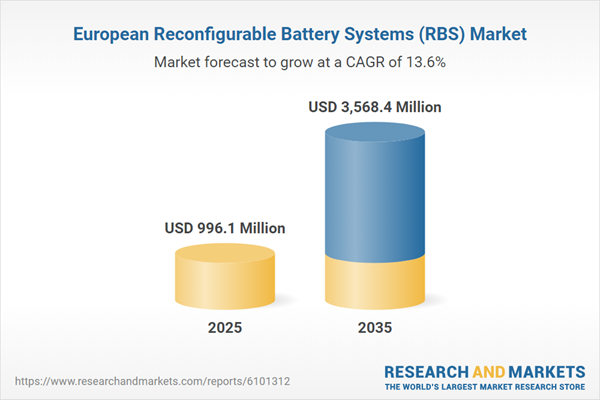Company Logo
The Europe reconfigurable battery systems (RBS) market is poised for substantial growth, with its value expected to soar from $897 million in 2024 to $3.56 billion by 2035, driven by a CAGR of 13.61% from 2025 to 2035. This surge is fueled by the demand for flexible energy storage solutions across sectors like grid stabilization, renewable integration, and EVs. Key trends include advancements in battery management systems, EU policies such as the Net-Zero Industry Act, and collaboration between utilities and startups. Despite challenges like regulatory fragmentation, the market is set to thrive with innovations in modular and smart battery systems. Leading players like VARTA AG and sonnen are pivotal in advancing this dynamic industry.
European Reconfigurable Battery Systems (RBS) Market
European Reconfigurable Battery Systems (RBS) Market
Dublin, July 10, 2025 (GLOBE NEWSWIRE) — The “Europe Reconfigurable Battery Systems (RBS) Market: Focus on Application, Type, and Country-Level Analysis – Analysis and Forecast, 2025-2035” report has been added to ResearchAndMarkets.com’s offering.
The Europe reconfigurable battery systems market was valued at $897.0 million in 2024 and is expected to reach $3.56 billion by 2035, with a CAGR of 13.61% from 2025 to 2035.
The market for reconfigurable battery systems (RBS), which combine modularity, scalability, and enhanced management to meet changing grid demands, is becoming a crucial part of Europe’s energy transformation. Operators can modify capacity, performance, and functionality in real time with reconfigurable battery systems, which are made up of interchangeable cell or module parts connected by power electronics and sophisticated battery management systems (BMS). Because of its versatility, RBS is perfect for a variety of applications where quick deployment and adaptation are crucial, such as commercial peak shaving, remote microgrids, large-scale renewable integration, and auxiliary grid services.
The increasing demand for flexible, scalable energy storage across industries like grid stabilisation, renewable energy integration, and electric mobility is driving the European RBS industry. RBS capabilities are growing thanks to developments in cell chemistry, flexible system topologies, and smooth interaction with Europe’s smart-grid platforms.
Deployment is being accelerated by ambitious EU climate targets and funding programs, which range from national green-energy subsidies to Horizon Europe research grants. Utility, OEM, and tech startup collaborations are propelling innovation in next-generation chemistries and second-life battery reuse. Reconfigurable systems are in a great position to seize new opportunities as authorities drive for a circular, locally sourced battery value chain, guaranteeing resilience, cost-effectiveness, and long-term competitiveness.
The European RBS market is expanding rapidly with to aggressive decarbonisation goals, advantageous EU policy frameworks, and rising investment in domestic battery production. While research into second-life EV batteries and emerging chemistries – like lithium iron phosphate (LFP) and solid-state prototypes – is expanding cost-effective options, the Net-Zero Industry Act and Critical Raw Materials Act are expediting approvals, encouraging local production, and guaranteeing sustainable sourcing and recycling. RBS services are becoming more and more linked with digital platforms and renewable energy sources for predictive maintenance and optimised dispatch as utilities and independent power producers look for robust, future-proof storage solutions.
Story Continues
